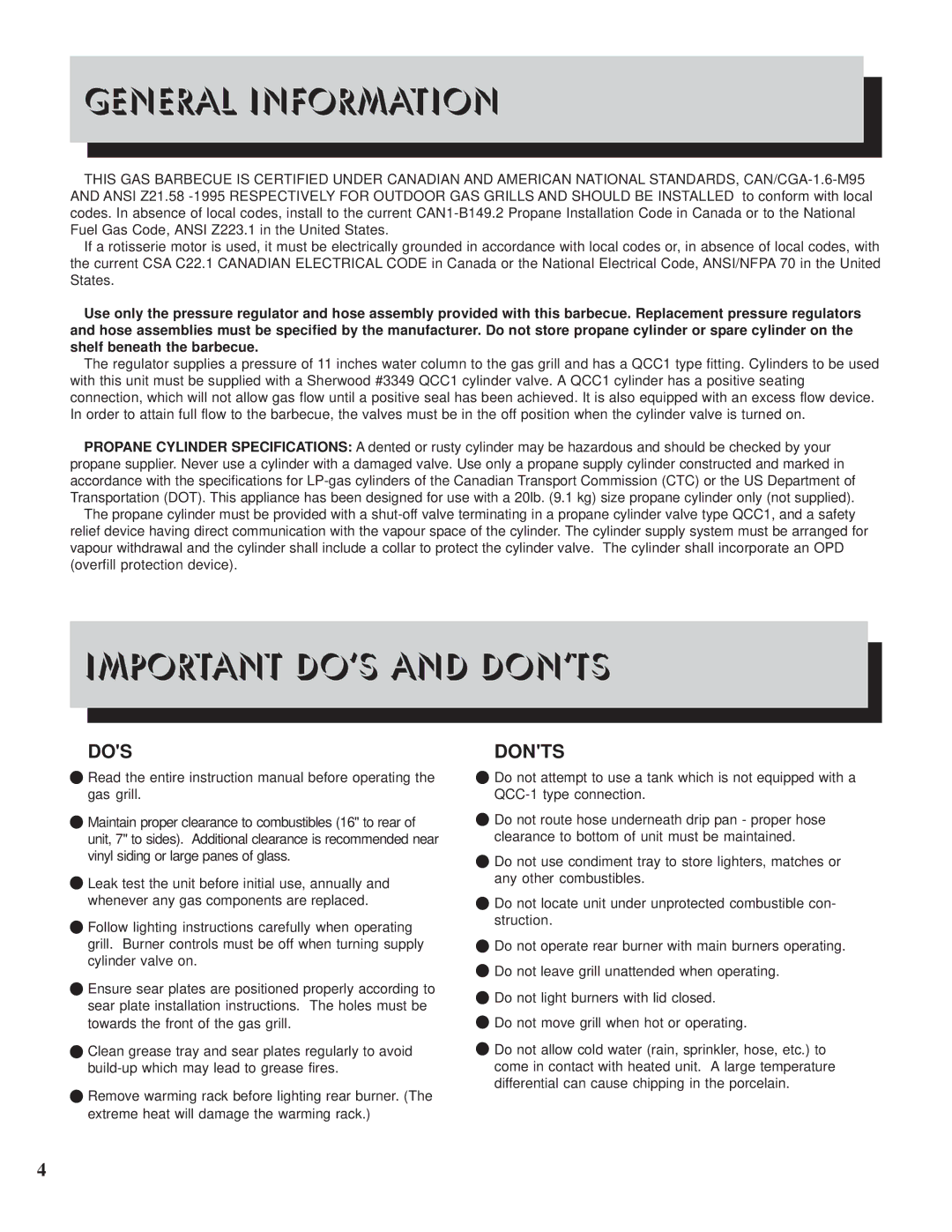
GENERAL INFORMATION
THIS GAS BARBECUE IS CERTIFIED UNDER CANADIAN AND AMERICAN NATIONAL STANDARDS,
If a rotisserie motor is used, it must be electrically grounded in accordance with local codes or, in absence of local codes, with the current CSA C22.1 CANADIAN ELECTRICAL CODE in Canada or the National Electrical Code, ANSI/NFPA 70 in the United States.
Use only the pressure regulator and hose assembly provided with this barbecue. Replacement pressure regulators and hose assemblies must be specified by the manufacturer. Do not store propane cylinder or spare cylinder on the shelf beneath the barbecue.
The regulator supplies a pressure of 11 inches water column to the gas grill and has a QCC1 type fitting. Cylinders to be used with this unit must be supplied with a Sherwood #3349 QCC1 cylinder valve. A QCC1 cylinder has a positive seating connection, which will not allow gas flow until a positive seal has been achieved. It is also equipped with an excess flow device. In order to attain full flow to the barbecue, the valves must be in the off position when the cylinder valve is turned on.
PROPANE CYLINDER SPECIFICATIONS: A dented or rusty cylinder may be hazardous and should be checked by your
propane supplier. Never use a cylinder with a damaged valve. Use only a propane supply cylinder constructed and marked in accordance with the specifications for
The propane cylinder must be provided with a
IMPORTANT DO'S AND DON'TS
DO'S | DON'TS |
![]() Read the entire instruction manual before operating the gas grill.
Read the entire instruction manual before operating the gas grill.
![]() Maintain proper clearance to combustibles (16" to rear of unit, 7" to sides). Additional clearance is recommended near vinyl siding or large panes of glass.
Maintain proper clearance to combustibles (16" to rear of unit, 7" to sides). Additional clearance is recommended near vinyl siding or large panes of glass.
![]() Leak test the unit before initial use, annually and whenever any gas components are replaced.
Leak test the unit before initial use, annually and whenever any gas components are replaced.
![]() Follow lighting instructions carefully when operating grill. Burner controls must be off when turning supply cylinder valve on.
Follow lighting instructions carefully when operating grill. Burner controls must be off when turning supply cylinder valve on.
![]() Ensure sear plates are positioned properly according to sear plate installation instructions. The holes must be towards the front of the gas grill.
Ensure sear plates are positioned properly according to sear plate installation instructions. The holes must be towards the front of the gas grill.
![]() Clean grease tray and sear plates regularly to avoid
Clean grease tray and sear plates regularly to avoid
![]() Remove warming rack before lighting rear burner. (The extreme heat will damage the warming rack.)
Remove warming rack before lighting rear burner. (The extreme heat will damage the warming rack.)
![]() Do not attempt to use a tank which is not equipped with a
Do not attempt to use a tank which is not equipped with a
![]() Do not route hose underneath drip pan - proper hose clearance to bottom of unit must be maintained.
Do not route hose underneath drip pan - proper hose clearance to bottom of unit must be maintained.
![]() Do not use condiment tray to store lighters, matches or any other combustibles.
Do not use condiment tray to store lighters, matches or any other combustibles.
![]() Do not locate unit under unprotected combustible con- struction.
Do not locate unit under unprotected combustible con- struction.
![]() Do not operate rear burner with main burners operating.
Do not operate rear burner with main burners operating. ![]() Do not leave grill unattended when operating.
Do not leave grill unattended when operating.
![]() Do not light burners with lid closed.
Do not light burners with lid closed.
![]() Do not move grill when hot or operating.
Do not move grill when hot or operating.
![]() Do not allow cold water (rain, sprinkler, hose, etc.) to come in contact with heated unit. A large temperature differential can cause chipping in the porcelain.
Do not allow cold water (rain, sprinkler, hose, etc.) to come in contact with heated unit. A large temperature differential can cause chipping in the porcelain.
4
